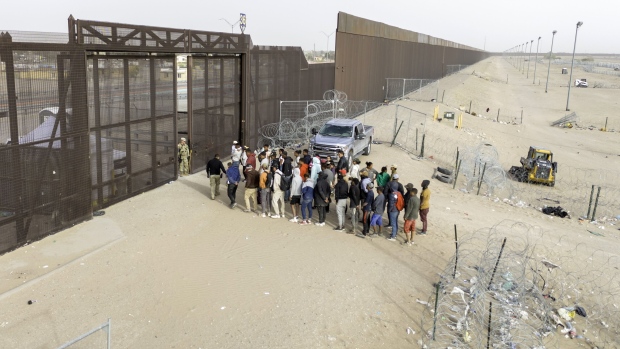Mar 20, 2024
Texas Deportation Law Gets Skeptical Reception From Key Judge
, Bloomberg News

(Bloomberg) -- A key judge on a panel of the 5th US Circuit Court of Appeals appeared skeptical of a Texas law that would allow the state to arrest and remove people who enter the country illegally.
Chief Judge Priscilla Richman on Wednesday questioned how the law would be enforced without complicating federal efforts at the border. She pointed to prior court precedents that grant immigration enforcement authority to the federal government.
“This is the first time, it seems to me, that a state has claimed they have the right to remove illegal aliens,” Richman said. “This is not a power that historically has been exercised by states.”
The hearing came after a day of procedural whiplash in the courts on Tuesday that ended with an order from the appeals court temporarily preventing Texas from enforcing the law. Hours earlier, the law went into effect briefly after the US Supreme Court rejected a Biden administration request to keep it on hold.
Richman is one of three judges considering the case. The panel includes Judge Irma Ramirez, who had previously said she would keep the law on hold for the time being, and Judge Andrew Oldham, who had supported letting the law go into effect.
The question before the panel now is whether the law should remain on hold while the 5th Circuit weighs an appeal by the state. A trial judge ruled last month that the measure conflicts with federal immigration law.
The measure, known as SB4, grants state officials the power to arrest, detain and deport people who enter the country illegally. Texas argues that the law is necessary to address the influx of people crossing the border, in the face of what state officials view as inaction by the federal government. The Biden administration says the law would be an unprecedented intrusion on federal power to set immigration policy.
The law closely resembles an Arizona statute that the Supreme Court mostly struck down 12 years ago. Richman pointed to the Arizona decision during Wednesday’s argument, specifically a section that says decisions about whether to remove someone from the country should be up to the federal government.
Border Crisis
“This statute washes that away,” she said of the Texas law.
Richman also questioned how the law might apply to a person who illegally crossed the US border in another state, and later came to Texas.
“I confess your honor, I don’t know,” said Texas Solicitor General Aaron Nielson.
During the hearing, Nielson reiterated the state’s argument that the law is “a modest but important statute” that mirrors federal immigration law.
“It is important because it helps address what even the president has called a border crisis,” he said.
Oldham asked a Justice Department lawyer to respond to Texas’ argument that the law is necessary because the federal government is not enforcing immigration law at the border.
“That is just wrong,” said Daniel Tenny, the Justice Department lawyer. “The way the federal government goes about this — because it is fundamentally an international exercise — is through collaboration with other nations.”
The judges concluded the hearing without indicating when they plan to rule on the pending motion for a stay. At least for now, the appeals court has arguments on the merits of the case scheduled for April 3.
The case is USA v. Texas, 24-50149, US Court of Appeals (5th Circuit).
--With assistance from Greg Stohr.
©2024 Bloomberg L.P.







